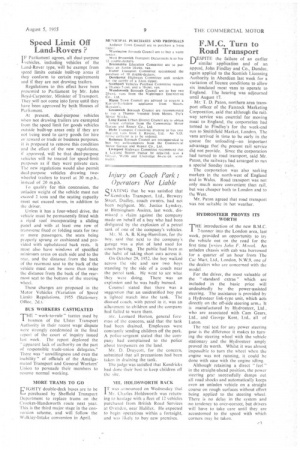Injury on Coach Park: Operators Not Liable
Page 41

If you've noticed an error in this article please click here to report it so we can fix it.
STATING that he was satisfied that Kendricks Transport, Ltd., Brewery Street. Dudley, coach owners, had not been negligent, Mr. Justice Lynskey, at Birmingham Assizes, last week, dismissed a claim against the company made on behalf bf a boy who had been disfigured by the explosion of a petrol tank of one of the company's vehicles.
Mr. M. A. B. King-Hamilton, for the boy, said that next to the company's garage was a plot of land used for coach park ing. The public had been in the habit of taking short cuts across it.
On October 29, 1952, the boy walked across the site and .saw two boys standing by the side of a coach near the petrol tank. He went to see what they were doing. There was an explosion and he was badly burned.
Counsel stated that there was a suggestion that an unidentified boy put a lighted match into the tank. The disused coach, with petrol in it, was an allurement to children and the company had failed to warn them.
i'. Leonard Horton, general foreman of the concern; said that the tank had been drained. Employees were constantly sending children off the park. A police-sergeant stated that the company had complained to the police about trespassers on the land.
MT. D. Draycott, for the concern, submitted that all precautions had been taken in draining the tank.
The judge was satisfied that Kend ricks had done their best to keep children off the site.
MR. 1101.DSWORTH HACK
I T was announced on Wednesday that Mr. Charles Holdsworth was returning to haulage with a fleet of 12 vehicles purchased from British Road Services at Ovenden, near Halifax. He expected to begin operations within a fortnight, and was likely to buy new premises.
F.M.C. Turn to Road Transport
DESPITE the failure of an earlier similar application and of an appeal, John Findlay and Co., Dundee, again applied to the Scottish Licensing Authority in Aberdeen last week for a variation of licence conditions to allow six insulated meat vans to operate to England. The hearing was adjourned until August 17.
Mr. T. D. Paton, northern area transport officer of the Fatstock Marketing Corporation, said that although the railway service was essential for moving meat to England, the corporation had turned to Findlay's for the week-end run to Smithfield Market, London. The vans arrived in time to be early in the queue for unloading—an important advantage that the present rail service did not provide. Since the corporation had turned to road transport, said Mr. Paton, the railways had arranged to run a special Sunday train, The corporation was also seeking markets in the north-west of England and in Wales. Road transport was not only muzh more convenient than rail, but was cheaper both to London and to the West.
Mr. Paton agreed that road transport was not suitable in hot weather.
HYDROSTEER PROVES ITS WORTH
THE introduction of the new B.M.C. /-tonner into the London area, last week, provided an opportunity to try the vehicle out on the road for the first time [writes John F. Moon). An unladen chassis with cab was borrowed for a quarter of an hour from The Car Mart, Ltd.. London, N.W.9, one of the dealers who are concerned with the model.
For the driver, the most valuable of the " standard extras" which are included in the basic price will undoubtedly be the power-assisted steering. The assistance is provided by a Hydrosteer link-type unit, which acts directly on the off-Side steering arm.. It is manufactured by Hydrosteer, Ltd., who are associated with Cam Gears, Ltd., and George Kent, Ltd.. all of Luton.
The real test for any power steering gear is the difference it makes to turning the steering wheel with the vehicle stationary and the Hydrosteer amply proved its worth. Whilst it was almost impossible to turn the wheel when the engine was not running, it could be done with ease with the engine idling Although retaining a direct " feel" in the straight-ahead position, the power steering gear successfully damps out all road shocks and automatically keeps even an unladen vehicle on a straight course on rough surfaces without effort being applied to the steering wheel. There is no delay in the system and no tendency to over-correct, but drivers will have to take care until they are accustomed to the speed with which corners may be taken.




































































































